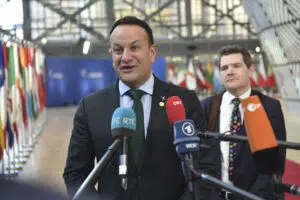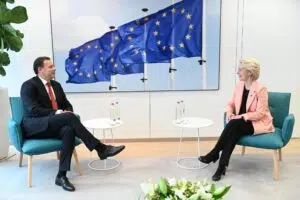Brussels – The European Populars are living on a roller coaster, not only in the run-up to June’s European elections—with growing grumblings over the nomination of Ursula von der Leyen as the joint candidate—but also in terms of the stability of heads of government. From Ireland to Portugal, in a single day, the European People’s Party saw the emergence of a new centre-right-led government and the resignation of a leader who, until a few hours earlier, did not seem particularly shaky. Ireland’s Leo Varadkar and Portugal’s Luís Montenegro are experiencing two opposite parabolas, but not too different in terms of the delicacy of the national political situation, with repercussions that are now being felt in Brussels as well.
Here Ireland

“I have come for more than 13 years to Brussels continuously as a minister or Taoiseach; there is a time when you have to let other people and other ideas come forward,” Varadkar explained to reporters this morning (March 21) on the sidelines of his latest European Council meeting, not letting on about the more political motivations for the choice—that came as a surprise yesterday (March 20)—to step down as head of Ireland’s government. Personal motivations remain (“in all these years I’ve had the privilege of representing Ireland, but it can’t be forever“), which also led him to step down as leader of the governing centre-right Fine Gael party: “I think change is a good thing for the party, for the government and the country, now there will be a debate about ideas, policies, and priorities.”
In early March, the Varadkar-led executive suffered a heavy defeat in two referenda to amend the 1937 Constitution (proposed by the governing coalition itself) on antiquated and discriminatory references to the role of women and the family in Irish society. Until the announcement of the resignation, it did not seem likely that the political repercussions could go this far, although, for Fine Gael, it may not necessarily mean the sudden end of power: Varadkar is now expected to remain in office temporarily until the appointment of the new party leader, who will then also become Taoiseach. The nationalist opposition Sinn Féin, however, is strongly calling for an early return to the polls (scheduled for next year), given also the fact that both local and European elections will be held on the island in less than 80 days. The resigning head of government ruled out the surprise move to target other EU-level offices and said: “I will run in my constituency and also focus on the European elections.”
Here Portugal
For an EPP leader who resigns, there is one who becomes prime minister. After the March 10 vote in Portugal that recognised the centre-right bloc of Democratic Alliance as the most voted party, the leader of the Social Democratic Party (PSD) Montenegro was appointed tonight by the President of the Republic, Marcelo Rebelo de Sousa, to head the government and is expected to take office on April 2. The new premier’s position is not so stable, however, since he will try to lead a minority executive (with 80 seats), not seeking an alliance with either the Socialist Party (78 seats) or Chega’s far-right (50 seats). Montenegro will appear in Parliament next week to look for a way to take his job forward: the most likely option is to agree with the Socialists on a program and cabinet that can also be supported by the centre-left (with an abstention or non-opposition).

From left: the appointed Prime Minister of Portugal, Luís Montenegro, and the President of the European Commission, Ursula von der Leyen (March 21, 2024)
“We are living a pivotal moment for Europe. I look forward to working together,” commented European Commission President Ursula von der Leyen after a meeting today with Montenegro on the sidelines of the European Council (which is likely to be attended by the resigning premier, António Costa, for the last time): “I wish you every success as prime minister of Portugal. This will benefit Europe as a whole.” The newly appointed premier also gave a clear indication to his own European family, again forcefully ruling out an alliance with the ultra-nationalists of Chega and resisting pressure from a group of centre-right parliamentarians who see this as the only option to guarantee a stable governing majority. “If there is no government agreement, the Democratic Alliance will be responsible for the instability that will result,” attacked the leader of the far-right party, André Ventura: “We continue to work hard to reach an agreement that will guarantee the country’s stability.”
English version by the Translation Service of Withub


![Il presidente della Repubblica, Sergio Mattarella, con la presidente della Commissione europea, Ursula von der Leyen [Bruxelles, 21 maggio 2025. Foto: Emanuele Bonini per Eunews]](https://www.eunews.it/wp-content/uploads/2025/05/mattarella-vdl-120x86.png)


![Il presidente della Repubblica, Sergio Mattarella (sinistra), con il presidente del Consiglio Europeo, Antonio Costa [Bruxelles, 20 maggio 2025. Foto: Quirinale]](https://www.eunews.it/wp-content/uploads/2025/05/mattarella-costa-120x86.jpeg)